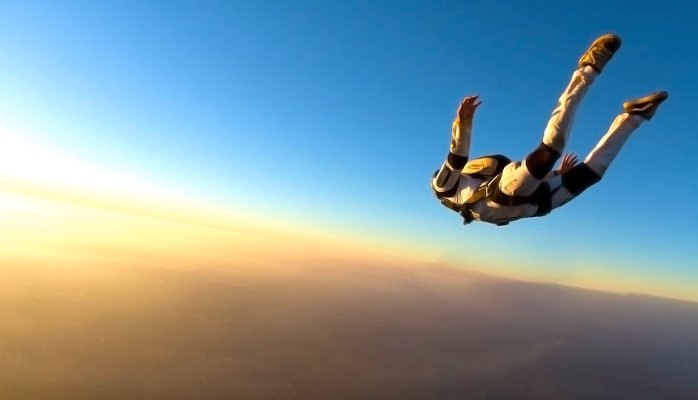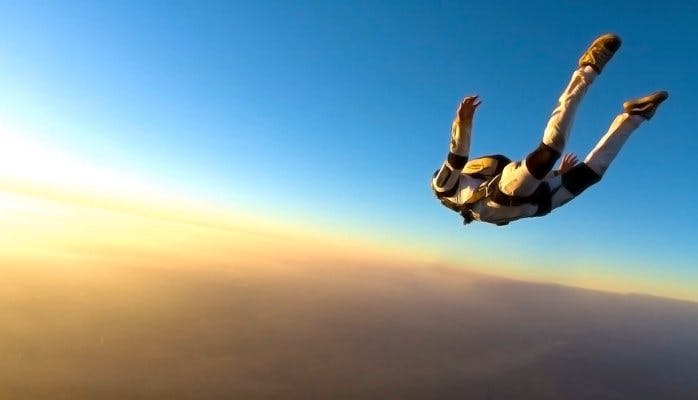
Juliana was anxious. She had jumped from a plane only three times in the last three years. Her friends needed her now. One of the members of their 4-Way skydiving team, in the last minute, couldn't participate in the Brazilian national skydiving competition. So, they turned to Juliana for filling in. With just a few hours of actual team practice, they went over the choreography movements on the ground just before climbing on the plane to perform their first official jump of the competition. They nailed it. At the end of the day, Juliana Sé and the team were Brazilian national champions.

In the same day, on the other side of the world, oblivious to what was happening to my cousin Juliana, I was listening to the audio book "The Rise of Superman" by Steven Kotler. The book is centered around explaining the concept of 'flow', especially among extreme sports professionals. "In positive psychology, flow, also known as the zone, is the mental state of operation in which a person performing an activity is fully immersed in a feeling of energized focus, full involvement, and enjoyment in the process of the activity". In his book, Kotler goes on to explain the rise of super athletes that are achieving seemingly impossible feats, breaking records more and more, faster and faster, and younger and younger in current times. These extreme athletes are performing stunts and achieving results that the previous generation of athletes deemed impossible, only to be then superseded by the next generation of athletes in a faster, exponential cycle. Kotler explained that these athletes are more and more accessing the state of flow, which enables them to perform perfectly in circumstances that they themselves never practiced specifically for.
But how do younger and younger people are being able to break world records and accomplish impossible feats faster and faster? Kotler mentions that, due to the advances in positive psychology, people are better understanding and practicing how to get to this state. He also gives a hint about the Roger Bannister Effect but, in my opinion, he falls just a little short in disclosing the real catalyst for the rise of super people: online video.
Chris Anderson, curator of TED, perfectly understands and explains the power of online video in breaking barriers and pushing innovation and performance forward (see his TED talk below). Basically, online videos allow for people to publish their feats to millions of others to watch. In that audience, people mirror and evolve from what they have watched and, in turn, publish their own videos. This creates a virtuous cycle that enables rapid evolution of any sport, art or activity. Online video capitalizes on the Roger Bannister Effect, allowing people to erase the mental blocker that deems a certain performance "impossible". It gives people real examples of what can be achieved and helps them trigger and exercise their mirror neurons, so, when they get into flow, they can achieve similar and greater feats.
But what all this has to do with learning and corporate training? Everything. Research on mirror neurons have shown that watching someone perform an activity fires the same neurons that would fire if the person was doing the activity themselves. This means that video examples of a well done activity should be one of the most effective learning tools available for mass training. Chris Anderson observes that our brains have been trained for millennia for learning by watching and replicating, while written or just explanatory teaching has been in effect for just the last few centuries. Video examples have the benefit of capturing the best practices while conveying all the nuances of nonverbal communication, with the added benefit that they can be replayed over and over again. And this is not only tied to extreme sports. It works with any human activity or behavior, being it in sports, arts, business or in the personal arena.
So, to uncover a bit more of Juliana's feat, she had been top in her sport before retiring to raise her son some years ago. She had won several national and international titles in other modalities and also was one of the people responsible for developing the skydiving wind tunnel technology currently used to speed up skydive learning worldwide. The team was also top in their sport, having won over a dozen national and international titles. But Juliana was out of practice and barely trained the movements with her recent teammates in advance. However, her partner was one of the team members and she had watched the practice videos many times just prior to the event, visualising her part in it. When the time came, she got into flow and her body simply knew what it needed to do. And she then became a national champion of another modality that day.
Happy learning!




